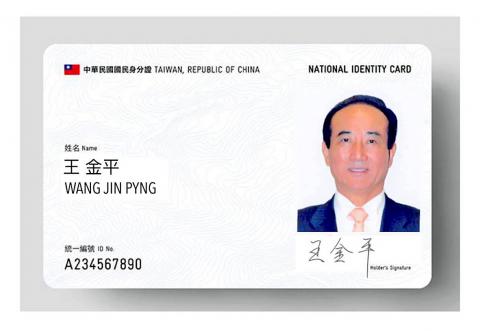The government in October next year is expected to launch electronic identification cards (eID) that combine the functions of existing national ID cards and Citizen Digital Certificates, which people use to file their taxes online, the Ministry of the Interior said yesterday.
The ministry is to complete the initial plan for issuing the cards in July and would share a more detailed plan, including the card’s design, in September, Minister of the Interior Hsu Kuo-yung (徐國勇) said.
The cards would integrate information from National Health Insurance cards and driver’s licenses, once cardholders activate the features, Hsu added.

Screen grab from Chinese Nationalist Party (KMT) Legislator Wang Jin-pyng’s Facebook page
The budget for establishing digital infrastructure and foundation services could require NT$4 billion (US$128.35 million), pending the Cabinet’s approval, the ministry said in a report submitted to the Legislative Yuan on Wednesday.
The new cards would be physical and virtual proof of identification; would allow digital signatures, privacy protection, autonomy of information disclosure; help with the transition to a “smart” government; have anti-counterfeit facilities; and would boost innovative applications and industry development, the report said.
Turning to security and privacy issues, the ministry said the cards could be used as proof of identity rather than as a device to store personal data, and therefore would not encroach on personal privacy.
The eID would contain less personal data than the current version, would be harder to counterfeit and would be equipped with the top-of-the-range identification technology to prevent information theft, the report said.
Cardholders would be able to access databases from various government agencies and public institutions, such as the National Health Insurance Administration.
The cards would also show cardholders’ marital status simply as “married” or “single,” but the name of their spouse would be stored on the card’s chip, a ministry official said at a legislative hearing yesterday.

SHIPS, TRAINS AND AUTOMOBILES: The ministry has announced changes to varied transportation industries taking effect soon, with a number of effects for passengers Beginning next month, the post office is canceling signature upon delivery and written inquiry services for international registered small packets in accordance with the new policy of the Universal Postal Union, the Ministry of Transportation and Communications said yesterday. The new policy does not apply to packets that are to be delivered to China, the ministry said. Senders of international registered small packets would receive a NT$10 rebate on postage if the packets are sent from Jan. 1 to March 31, it added. The ministry said that three other policies are also scheduled to take effect next month. International cruise ship operators

HORROR STORIES: One victim recounted not realizing they had been stabbed and seeing people bleeding, while another recalled breaking down in tears after fleeing A man on Friday died after he tried to fight the knife-wielding suspect who went on a stabbing spree near two of Taipei’s busiest metro stations, Taipei Mayor Chiang Wan-an (蔣萬安) said. The 57-year-old man, identified by his family name, Yu (余), encountered the suspect at Exit M7 of Taipei Main Station and immediately tried to stop him, but was fatally wounded and later died, Chiang said, calling the incident “heartbreaking.” Yu’s family would receive at least NT$5 million (US$158,584) in compensation through the Taipei Rapid Transit Corp’s (TRTC) insurance coverage, he said after convening an emergency security response meeting yesterday morning. National

The Forestry and Nature Conservation Agency yesterday launched a gift box to market honey “certified by a Formosan black bear” in appreciation of a beekeeper’s amicable interaction with a honey-thieving bear. Beekeeper Chih Ming-chen (池明鎮) in January inspected his bee farm in Hualien County’s Jhuosi Township (卓溪) and found that more than 20 beehives had been destroyed and many hives were eaten, with bear droppings and paw prints near the destroyed hives, the agency said. Chih returned to the farm to move the remaining beehives away that evening when he encountered a Formosan black bear only 20m away, the agency said. The bear

PLANNED: The suspect visited the crime scene before the killings, seeking information on how to access the roof, and had extensively researched a 2014 stabbing incident The suspect in a stabbing attack that killed three people and injured 11 in Taipei on Friday had planned the assault and set fires at other locations earlier in the day, law enforcement officials said yesterday. National Police Agency (NPA) Director-General Chang Jung-hsin (張榮興) said the suspect, a 27-year-old man named Chang Wen (張文), began the attacks at 3:40pm, first setting off smoke bombs on a road, damaging cars and motorbikes. Earlier, Chang Wen set fire to a rental room where he was staying on Gongyuan Road in Zhongzheng District (中正), Chang Jung-hsin said. The suspect later threw smoke grenades near two exits